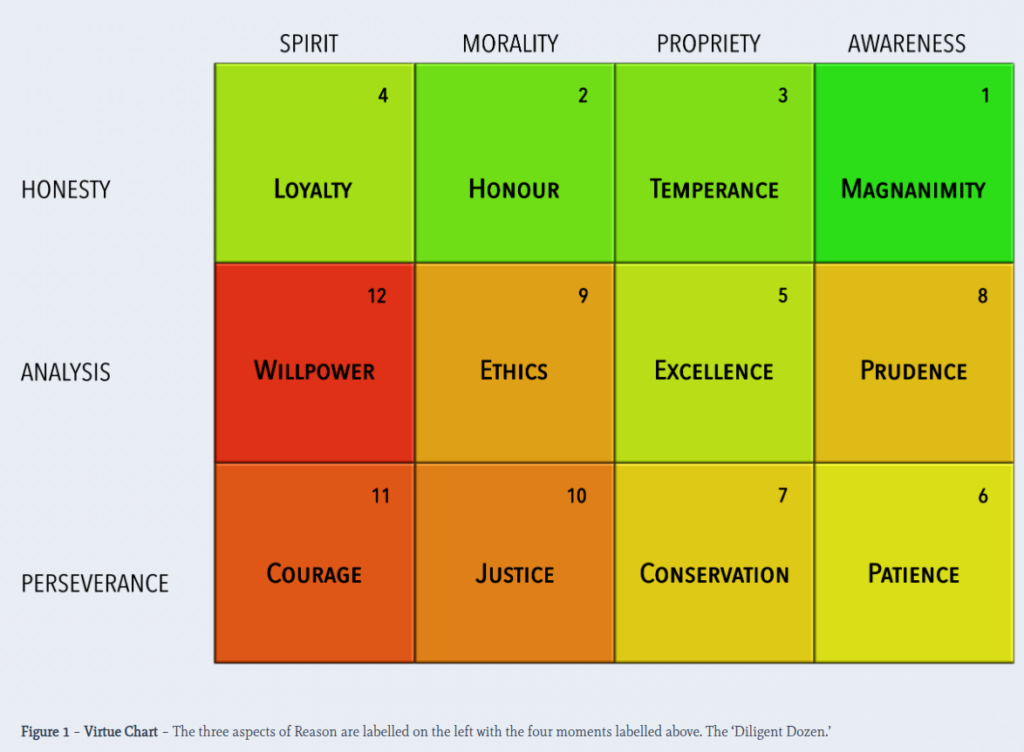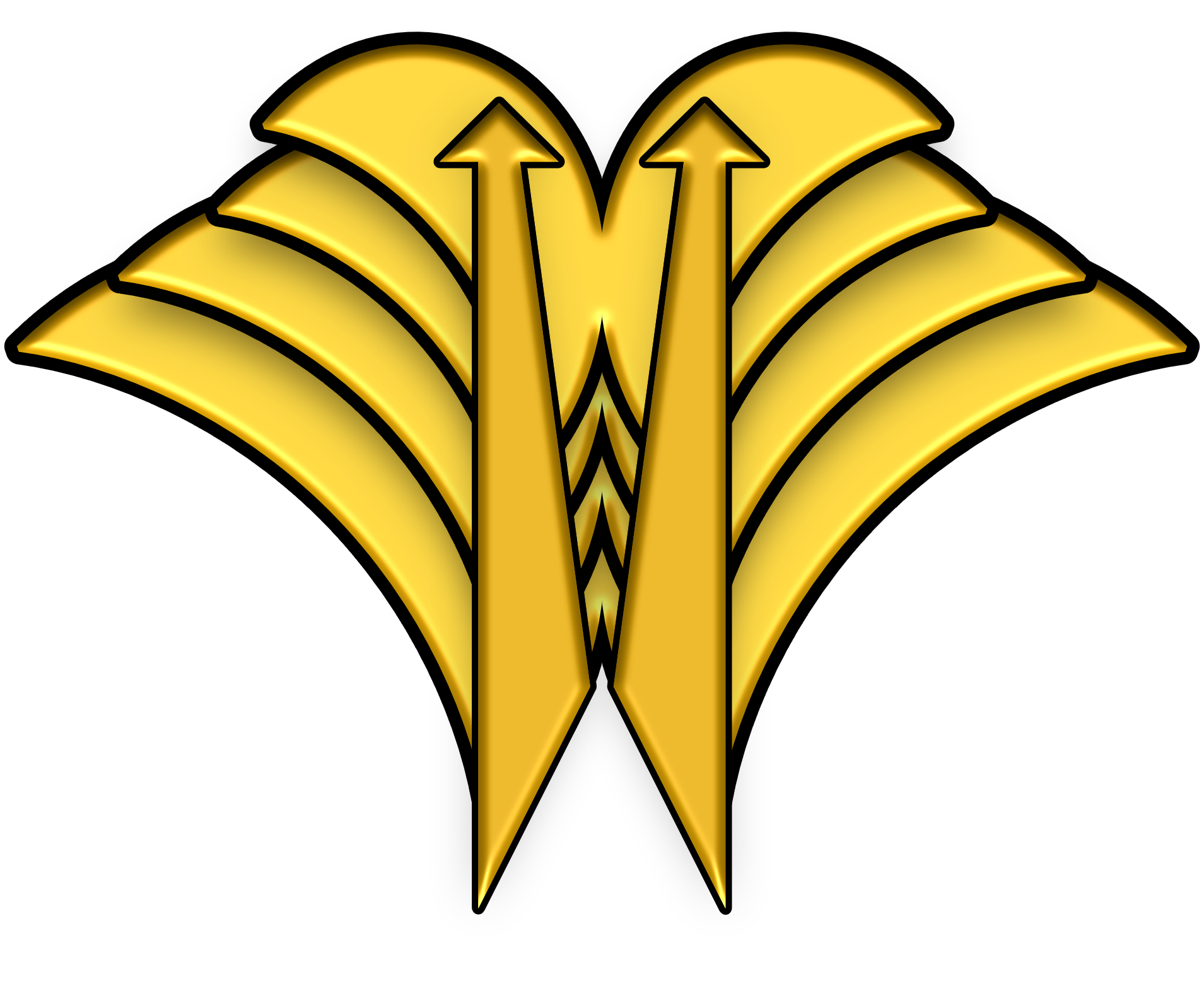What is the secret to becoming a great leader? What kind of being reveals the future ideal self through the alchemy of action? Who is controlled by and who controls the mirror of perception? Who transforms the feedback loop into an ever-unfolding scroll of divine Truth? Willpower is the divine spark that kindles the light of virtue within us all, by pulling all the other virtues up with it; gold is valueless in comparison. Let us explore how this process elevates the leader above manipulation and puppetry, forging leading which lifts others up through the unshakeable power of loyalty cast in strength.
The Mirror of Action: How the Future Ideal Self is Demonstrated
We are all actors in plays written by our own hands, the problems accrue when we don’t write our parts well enough, most often due to being unaware of purpose or options available. As well, the stage upon which we perform shifts with every choice we make. To demonstrate the future ideal self is to act as if we already embody that vision, thereby shaping reality through the lens of our actions. This is a profound act of will and declaration that we are not bound by the present and past to a future out of our hands, but are instead architects of possibility.
Consider this: when you walk into a room and choose to radiate calm, even in chaos, you do more than alter your own demeanour, you reshape the environment itself. The people around you begin to perceive the world through the filter of your presence, and their actions, in turn, respond to that new reality. This is yet another example of that feedback loop: e > i > p > i > e or, perhaps more accurately: (p)perception > (i)information > environment + [(p+i)thought] > information + p > perception + i. Here is the key: your actions are the catalyst for shifts in this cycle, and can do the greatest good. Action does greatest good, but only insofar as aligned to Good and God.
To demonstrate the future ideal self through action is to engage in “perceptual alchemy.” When you act with honesty, you do not merely tell the truth, you become the embodiment of progressive self, altering the very fabric of your relationships and surroundings to be more in line with not simply progress but its measure; to lie is to bring about the opposite, in confusion. When you choose to be aware of the importance in perseverance, you do not simply wait, you model a new way of being in time in self: adopting a more deliberate rhythm to life as well as inspiring yourself and others thus. This is how the feedback loop rebounds: your actions become new information, which reshapes perception, which then alters information forcing a new dynamic with environment and finally inspiring further change of self and environment, et cetera, creating an ever-expanding ripple of transformation.
This process is not linear but cyclical in a dance between the self and the world. The future ideal self is not a destination but a demonstration, the required antecedent in testament to what we become. It is through actions that we reveal our deepest truths, and in doing so, we become the very visionaries of our own destiny.
The Divine Spark: Willpower as Divine Truth
Nowhere is this principle more vividly expressed than in the virtue of willpower, zenith of reason’s creation. In Structural Virtues Theory, willpower is not merely a tool for self-discipline; it is the penultimate fruit of the twelve virtues, a culmination of all that precedes it and guarantee of the thirteenth skill in Reason. It is the spark that ignites the flame of Truth within us, a truth so profound that it transcends the material world and touches the divine: God acts most in this world through us, and loves us too much to intercede or take any part of it from us.
Nothing in this is about forcing oneself to do something difficult, but allowing the self to align with its highest potential in spirit. When you act in accordance with your virtues, you participate in a cosmic dance of Universal Order and harmony. This is divine truth more valuable than any gold. Gold may be a material treasure, but willpower is the currency of the soul‘s continuance, the unyielding force that shapes reality through intention and actions.
To possess willpower is to understand that the self is not of the self but of a greater concordance. This concordance is both terrifying and liberating. It means that we are never bound by past failures or present limitations; instead, we are set free by our ability to learn from them and the infinity of internal improvement before us: which is an elaborate way of saying ‘maximising upon God’s Ever-Lasting Grace.’ So this freedom comes with a price of utter responsibility: willpower demands that we will our virtues into being, not as passive recipients of morality but as active participants in the creation of greater good, not for ourselves.
Willpower enables us to transcend corruption and become true leaders. When a leader is rooted in willpower deeply entrenched amongst all the virtues, they become much less subject to the pressures of external forces. They are sovereigns of their own inner world, capable of shaping themselves to needs and purpose of each moment. This is the essence of the ultimate advantage: the virtues, especially willpower, make a leader not a puppet but a sovereign of virtue, a King’s king, whose authority arises from foundations of honesty, honour, trust, loyalty, and character.
The Ultimate Advantage: Leadership Without Puppetry
The power of the virtues is especially evident in the realm of leadership. In an age where manipulation and control often masquerade as strength, leading others emerges not through dominance but through servanthood. The virtues are the ultimate advantage for a leader who genuinely wishes to lift up their followership.
Let us break this down:

- Magnanimity is the foundation of all virtuous leadership. It is the virtue that allows the leader to see beyond themselves, and recognising potential. A magnanimous leader does not seek personal glory but instead cultivates a vision where each person can flourish.
- Honour ensures that this vision is rooted in integrity. A leader who acts with honour does not manipulate or exploit; they lead through example, inspiring others to rise to their own highest potential.
- Temperance prevents the leader from succumbing to excess: in power, wealth, or influence. It is the virtue that keeps the leader grounded, ensuring that their actions are guided by wisdom rather than ambition.
- Loyalty strengthens bonds, creating trust, and improving mutual support. A virtuous leader does not demand loyalty; they earn it through consistently well-reasoned ethical demonstrations; virtues and improvement.
- Excellence, Patience, and Conservation form the triad that sustains leadership over time. Excellence is about identifications within a team through which the leader strives for greatness, patience allows them to cooperate despite differences in skills, and conservation enables the leader to prioritise people within their team over product or profit.
- Prudence is the guardian of wisdom, enabling the leader to make decisions that benefit not only themselves, their team, or organisation, but the entire community as well.
- Ethics and Justice are the moral compasses that guide the leader’s actions, ensuring that power is used to uplift rather than denigrate or victimise.
- Courage allows the leader to confront adversity without fear, standing firm in their values even when the world around them wavers.
- Willpower, as we have seen, is the final and most sacred of the diligent dozen virtues, as unyielding commitment to Truth, Good, and God.
Together, these virtues form a constellation that elevates leadership from mere authority into sacred responsibility, as it should. A leader who embodies these virtues does not need to manipulate or control; their presence alone is enough to inspire. They are the ones who turn chaos into order, confusion into clarity, and despair into hope.
The Feedback Loop as a Mirror of Virtue
Let us now return to the feedback loop that weaves through all domains of Resurrexit theory. This loop is not merely an abstract concept, it is the very mechanism through which experience and the lessons it teaches are cultivated and leadership is realised.
This is the essence of virtuous leadership: it is a self-reinforcing cycle where each group of actions becomes seed: growing into forests of change. It starts with virtuous living and active progress immanently. The true leader becomes a mirror for the future ideal self, as testament to what humanity can achieve when it chooses virtue over vice. Their willpower is not in the power they wield, but in the Truth they hold fast to within, in the strength to overcome weakness, and the next weakness after that. Through this bare truth, they lift others up most, not by force, fancy words, or manipulation, but by example.
The Virtues as the Ultimate Advantage: A Leader Beyond Puppetry
In a world where leaders are often reduced to puppets of ambition or manipulation, the virtues offer a radical alternative. To be a leader rooted in the virtues is to reject tyranny of nonsense power games for the freedom of absolute purpose. Such a leader does not need to manipulate; their very presence inspires self-control through example.
The puppet leader manipulates information and perception to maintain authority, feeding on fear and division. Such non-leaders will often abuse their power, and seek more, especially leverage. They’re so practised in this manipulation that they often remain unaware of their own deceit, concealing it even from themselves until such time as it “slips” out at the wrong time. Afterwards, they’ll act shocked. Their power is fragile, dependent on external forces that can always be disrupted.
The virtuous person knows that that their deeds are patterned after their thoughts, especially to the thing being acted upon and cared about. The virtuous actor then must regard themselves from a position of self-care and aforethought. Concentration and meditation upon actions is the primary way in which we may control their demonstration. The virtuous leader thus operates from a place of internal sovereignty. They are not bound by the whims of others; their authority arises from deeper wells.
A virtuous leader does not need to win popularity contests or secure wealth, they are already the victor in the most important battle: the battle for the soul of humanity. Their power is in transformation.
The Divine Truth of Willpower: A Call to Action
In closing, let us return to the heart of this matter: willpower as path to divine Truth. Willpower is not merely a virtue. It is revelation. When we choose to act with regard beyond ourselves and for the greater Good, we are not just changing our own lives; we are participating in the unfolding of greater Truth.
This is the ultimate advantage for any leader: to be rooted in virtues and not manipulation. To demonstrate Truth through action, and thereby alter the feedback loop, is to become a sower of Truth and gardener of the ideal future self. When we sow Truth in our own progress and the progress of others, we do more than plant seeds in transforming the world.
Willpower is the divine spark that turns the ordinary into the extraordinary. Let us be leaders who lift others up through the immortal light of virtues. Let us reveal greater Truth through a brighter future we forge, as not awaited. Our future is already present, though simply not properly distributed yet.
